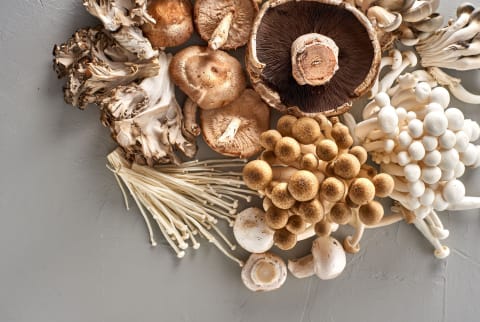Advertisement
The Best Way To Use Mushrooms For Age-Reversing & Potent Detoxification


Mushrooms are often used as a tasty addition to many meals without much thought given to their nutritional value. While fungi aren't always the most appealing choice to everyone, mushrooms have been used for thousands of years in many cultures for their medicinal properties, and research is now starting to prove what people have known for years—mushrooms are one powerful superfood group.
In my functional medicine clinic, I encourage regular consumption of mushrooms to my patients. There are thousands of mushrooms in existence ranging from poisonous to psychedelic, but I focus on the ones that are considered adaptogenic. These varieties support and bring balance to different areas of the body that are out of whack while also still being sulfuric to aid in methylation—your body's regulator of detox and inflammation pathways.
So next time you hit the grocery store, step away from your usual Portobello, and reach for these other next-level varieties to seriously elevate your health:
1. Chaga
Often used in Eastern European traditional folk medicine, current research is proving chaga's ability to help heal various ailments1. In particular, the phenolic content in chaga makes it a powerful tool to fight free radicals to reduce cell oxidation and help your skin glow.
Chaga is also used as an antiviral against the flu2 and has been shown to boost and rebalance the immune system3.
2. Cordyceps
If you are really looking for natural beauty support, look no further than cordyceps. This mushroom will act as your fountain of youth by increasing the antioxidants glutathione peroxidase and superoxide dismutase4 while decreasing lipid peroxidation activity and pro-inflammatory monoamine oxidase, which contribute to signs of aging. Cordyceps also does wonders to rebalance hormones and help restore energy for those struggling with adrenal fatigue5.
3. Lion's mane
For anyone looking for added brain support, my first recommendation is Lion's mane. Its neuroprotective properties are second to none and the perfect choice for alleviating brain fog and enhancing cognitive function due to its amount of nerve growth factors, which protect and regenerate brain tissue. One study found that those who took a lion's mane supplement for 16 weeks6 showed significantly higher cognitive function compared to those who didn't.
4. Maitake
Maitake can improve glucose tolerance and blood sugar in cases of diabetes7.
5. Oyster
If you are struggling with systemic inflammation, load up on oyster mushrooms, which have been found to soothe inflammation and aid in healing inflammation-related health problems such as heart disease8.
6. Reishi
Blood sugar issues are a serious problem in our society with 50 percent of Americans being either prediabetic or diabetic9. Ongoing blood sugar problems can contribute to further hormone imbalances, fatigue, weight loss resistance, chronic inflammation, and so much more. Focusing on a plant-based ketogenic diet is one way to battle this epidemic, and mushrooms are a great nutrient-dense low-carb option.
Multiple studies10 have proved reishi's ability to lower blood sugar in those diagnosed with diabetes as well as down-regulating alpha-glucosidase, the enzyme responsible for turning starch into sugar in the body10. It can also help improve symptoms associated with diabetes such as kidney problems11 and poor wound healing12.
7. Shiitake
Packed with B vitamins, shiitake mushrooms work to support optimal brain health13 and healthy adrenal function14. This mushroom also has powerful antimicrobial properties15 and cholesterol-lowering abilities16.
8. Turkey tail
Perhaps one of my personal favorites from this list, and the most well-researched, it is my go-to choice for patients dealing with small intestinal bacterial overgrowth (SIBO) and candida yeast overgrowth.
Are mushrooms safe for everyone?
The beauty of adaptogens is that they are generally safe for everyone. Since every person's health case is different, what works for one person may not be the most relevant for another. Specific dosages can vary, but I like to recommend to my patients having some type of adaptogenic mushroom three times a week minimum. Start out small and give your body time to adjust before gradually increasing your dosage.
What's the best way to eat therapeutic mushrooms?
I personally like to incorporate whole mushrooms into my regular meals sautéed as a side dish or on top of my salads. When buying whole mushrooms, it is essential to look for organically grown varieties as conventional mushrooms can be highly toxic due to the fact that mushrooms are extremely porous in nature and easily absorb pesticides and other chemicals. Depending on the stores in your area, it may be more difficult to find organic versions of adaptogenic mushrooms since they are such a specialty item. If this is the case, you can buy dried mushrooms online or, to save on cost, buy an organic kit online and grow your own! Not only will you be getting nutritious food medicines, you'll have a fun new hobby!
If you're not a fan of the taste or texture of mushrooms, you can get these in powdered form, extracts, or in supplement form. Just like the whole food versions, you need to make sure these are organic. Some of my favorite brands include OM and Four Sigmatic. When you are in a hurry, powders are a great way to get your serving in of adaptogenic mushrooms for the day as they can be added to any beverage, smoothies, soups, or sprinkled on top of your favorite meals. I love to add these to my coffee to make an elevated adaptogenic latte.
Age-Reversing Mushroom Latte
Ingredients
- 1 cup organic hot coffee
- ½ teaspoon each powdered chaga and cordyceps
- Desired amount of almond or coconut milk
- 2 tablespoons raw cacao powder
- 1 tablespoon raw organic honey or other desired sweetener; add more or less to taste
Method
- Add hot coffee into a large coffee mug.
- Add in mushroom powder, cacao powder, and desired sweetener to coffee and stir to combine.
- Pour in milk and froth with a milk frother.

Will Cole, IFMCP, DNM, D.C., is a leading functional medicine expert who consults people around the globe, starting one of the first functional medicine telehealth centers in the world. Named one of the top 50 functional and integrative doctors in the nation, Dr. Will Cole provides a functional medicine approach for thyroid issues, autoimmune conditions, hormonal imbalances, digestive disorders, and brain problems. He is the host of the popular The Art Of Being Well podcast and the New York Times bestselling author of Intuitive Fasting, Ketotarian,The Inflammation Spectrum, and Gut Feelings.
More from the author:
Functional Nutrition Training
Check out Functional Nutrition Coaching
A cutting-edge nutrition deep dive taught by 20+ top health & wellness experts
Learn moreMore from the author:
Functional Nutrition Training
Check out Functional Nutrition Coaching
A cutting-edge nutrition deep dive taught by 20+ top health & wellness experts
Learn more
Will Cole, IFMCP, DNM, D.C., is a leading functional medicine expert who consults people around the globe, starting one of the first functional medicine telehealth centers in the world. Named one of the top 50 functional and integrative doctors in the nation, Dr. Will Cole provides a functional medicine approach for thyroid issues, autoimmune conditions, hormonal imbalances, digestive disorders, and brain problems. He is the host of the popular The Art Of Being Well podcast and the New York Times bestselling author of Intuitive Fasting, Ketotarian,The Inflammation Spectrum, and Gut Feelings.
16 Sources
- https://www.ncbi.nlm.nih.gov/pubmed/22135889
- https://www.ncbi.nlm.nih.gov/pubmed/22462058
- https://www.ncbi.nlm.nih.gov/pubmed/15970296
- https://www.ncbi.nlm.nih.gov/pubmed/18803231
- https://www.ncbi.nlm.nih.gov/pubmed/20804368
- https://www.ncbi.nlm.nih.gov/pubmed/18844328
- https://www.ncbi.nlm.nih.gov/pubmed/11349892
- https://www.ncbi.nlm.nih.gov/pmc/articles/PMC3120742/
- https://jamanetwork.com/journals/jama/fullarticle/2434682
- https://www.ncbi.nlm.nih.gov/pubmed/21596546
- https://www.ncbi.nlm.nih.gov/pubmed/17145658
- https://www.ncbi.nlm.nih.gov/pubmed/22508065
- https://www.ncbi.nlm.nih.gov/pubmed/17052662
- https://www.ncbi.nlm.nih.gov/pubmed/10468649
- https://www.ncbi.nlm.nih.gov/pubmed/21966183
- https://www.ncbi.nlm.nih.gov/pubmed/7643248